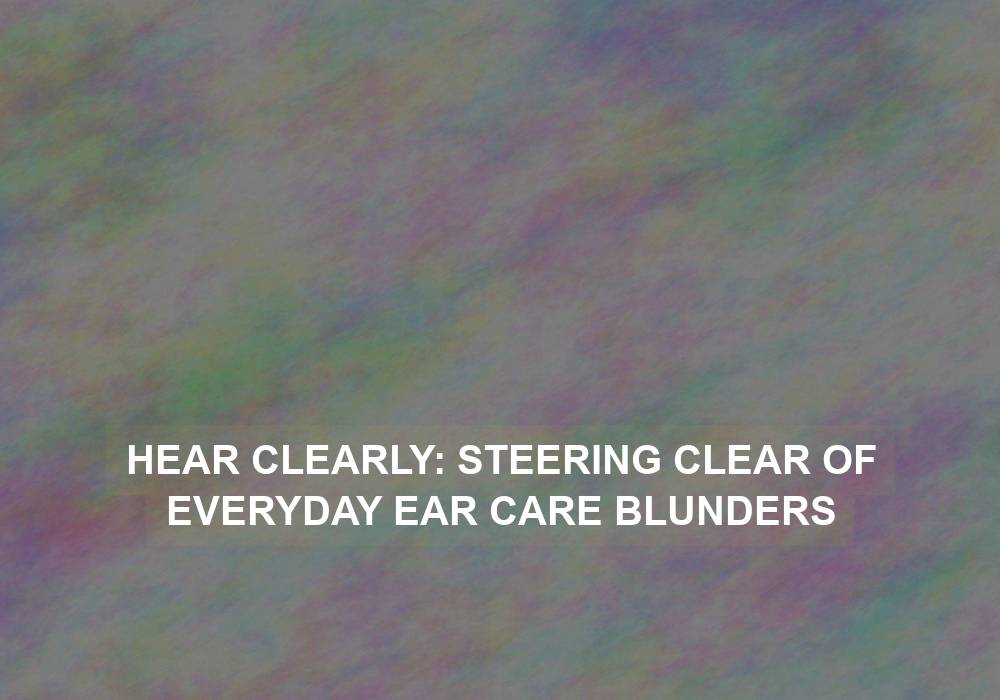Taking care of our ears is often overlooked, but it plays a vital role in our overall well-being. Our ears not only enable us to hear the world around us but also help maintain our balance. Unfortunately, many people make avoidable mistakes when it comes to ear care, leading to various ear problems. In this article, we will explore common ear care blunders and provide expert advice on how to avoid them.
Importance of Ear Care
Before delving into the blunders, it is crucial to understand why ear care is vital. Our ears are delicate organs that require proper maintenance to function optimally. Neglecting ear care can result in several issues, such as ear infections, hearing loss, tinnitus (ringing in the ears), and balance problems.
By implementing good ear care practices, we can prevent these problems and ensure our ears remain healthy and functional.
1. Using Cotton Swabs
Many people reach for cotton swabs to clean their ears, thinking they are doing the right thing. However, using cotton swabs to clean the ear canal is a common mistake. The ear canal is self-cleaning, and inserting cotton swabs can push earwax further into the canal, causing blockages and potential damage.
Expert Advice: To clean your ears, use a warm washcloth to gently wipe the external part of the ear. This helps to remove any dirt or debris accumulated on the outer ear. If you experience excessive earwax buildup or have discomfort, it is recommended to consult a healthcare professional. They can safely remove the earwax or provide guidance on proper ear cleaning techniques.
2. Ignoring Ear Protection
Our ears are exposed to various loud noises daily, such as traffic, construction, or loud music. Prolonged exposure to loud sounds can damage the delicate structures in the ear, leading to hearing loss.
Expert Advice: Whenever you are exposed to loud noises, whether at a concert, construction site, or while using power tools, wear ear protection such as earplugs or earmuffs. These devices help to reduce the intensity of sound reaching your ears, protecting them from potential damage. It is important to choose ear protection that fits well and provides adequate noise reduction.
3. Neglecting Ear Hygiene
Maintaining proper ear hygiene is essential for preventing infections and other ear problems. Neglecting cleanliness may lead to conditions like swimmer’s ear, which is caused by bacteria growing in the moist environment of the ear canal.
Expert Advice: After swimming or taking a shower, gently dry your ears with a towel or use a hairdryer on a low setting. This helps to remove excess moisture from the ear canal, reducing the risk of bacterial growth. It is important to avoid inserting anything into your ear canal, as this may damage the delicate skin and promote bacterial growth. If you experience any discomfort, redness, or discharge from the ears, it is recommended to seek medical attention.
4. Using Incorrect Headphones
Listening to music or other audio through headphones is a common activity for many people. However, using incorrect headphones or listening at excessively high volumes can cause damage to the ears.
Expert Advice: Opt for over-ear headphones instead of earbuds, as they provide better noise isolation and reduce the need to turn up the volume. Over-ear headphones distribute sound more evenly, minimizing the risk of exposing certain parts of the ear to excessive sound pressure. Additionally, adhere to the 60/60 rule – listening at 60% volume for no more than 60 minutes at a time. This rule helps to prevent prolonged exposure to loud sounds, reducing the risk of hearing damage.
5. Neglecting Regular Check-ups
Regular check-ups with an audiologist or healthcare professional are vital for maintaining ear health. Many ear problems can be detected early through routine examinations, enabling prompt intervention and treatment.
Expert Advice: Schedule regular check-ups with an audiologist or healthcare professional, especially if you experience any changes in your hearing, balance, or ear health. They can perform thorough evaluations of your ears, including hearing tests, and identify any potential issues. Early detection allows for timely intervention, preventing further complications and ensuring appropriate treatment measures are implemented.
Conclusion
Caring for our ears should be an integral part of our overall health routine. By avoiding common ear care blunders and implementing good practices, we can ensure our ears remain healthy and functional. Remember to avoid using cotton swabs, protect your ears from loud noises, maintain proper ear hygiene, use the right headphones, and schedule regular check-ups. Prioritizing ear care will go a long way in preserving your hearing and preventing potential complications.
